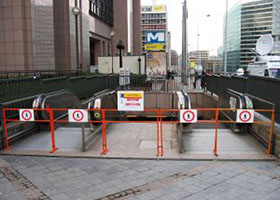
 Since WikiLeaks began publicly releasing US embassy cables, I’ve been watching out (typically via the Guardian and Aftenposten) for any that reference SWFs. And, while there have been a few (e.g. here and here), SWFs have played a very minor role and have only been referenced in passing. It would seem that US diplomats had overlooked the SWF phenomenon, which, by the way, had captivated much of the policy foreign policy world in 2007-2008.
Since WikiLeaks began publicly releasing US embassy cables, I’ve been watching out (typically via the Guardian and Aftenposten) for any that reference SWFs. And, while there have been a few (e.g. here and here), SWFs have played a very minor role and have only been referenced in passing. It would seem that US diplomats had overlooked the SWF phenomenon, which, by the way, had captivated much of the policy foreign policy world in 2007-2008.
Then, last week, I came across this “sensitive but unclassified” cable (REF: STATE 153075) from November of 2007, which is entitled “Norway and Sovereign Wealth Funds.” The cable offers a recap of a meeting between US embassy staff and Martin Skancke (the cable says “Martin Shanke”, but we can assume that’s just a spelling mistake).
It’s worth a look, as the cable offers some insights into the closed-door discussions that were taking place in 2007 about SWFs. In addition, it offers an insider’s take (Skancke’s) on the GPF-G’s operations. Here is a summary lifted from cable:
“In a November 5 briefing to the diplomatic corps, the Ministry of Finance DG reviewed Norways approach to Sovereign Wealth Funds and the status of Norways approximately $350 million Global Fund (formerly known as the Pension Fund). He said that Norways application of the Ethical Guidelines, which has heavily impacted US companies, is not ideal and an upcoming evaluation may help improve them. The DG also explained that Norway is considering possible divestments from companies building pipelines in Burma. Finally, he noted the possibility of positive investments in companies promoting the public good.”
As this suggests, the US diplomats were keenly interested in the GPF-G’s ethical guidelines and negative screens. Why? Well, perhaps it is due to the fact that 12 of the 21 companies (at the time) that the Norwegian SWF had “negatively screened” out of their portfolio (i.e. divested from) were American.
“Moving to the Ethical Guidelines which have been a source of controversy, Shanke said that the Fund has a negative screening process as well as an ad hoc review process. The negative screening is designed to weed out companies who handle “weapons that through their normal use may violate fundamental humanitarian principles” which he identified as weapons such a cluster munitions or nuclear weapons. (Note: it is as a result of this screening that Norway divested from several American arms manufacturing companies.)”
The cable then goes into detail on the screening process and how the American companies ended up on the notorious exclusion list. And then the cable recounts an interesting exchange between an embassy official and Skancke:
“In response to a question from Emboff which suggested that companies that operate transparently and in open economies may be discriminated against, Shanke agreed that that could happen and that the process is second-best. In the 1990s, his Ministry had argued against an ethical screen because of this problem. Today, with more information available, he thought the system was good enough. He pointed out that an evaluation of the whole process in 2008 may lead to fine-tuning. He welcomed engagement with others on this issue. Finally, he noted that more transparent companies are often easier to engage and so it is more likely that the Central Bank would evaluate them as amenable to negotiations-something which might offset the initial discrimination.
In other words, Skancke ends by suggesting, ‘If we divested from your companies, it’s probably because we had a pretty good reason.’ Fascinating stuff. Now, where’s that US embassy cable from Beijing on the CIC?
This post originally appeared on the Oxford SWF Project website.
